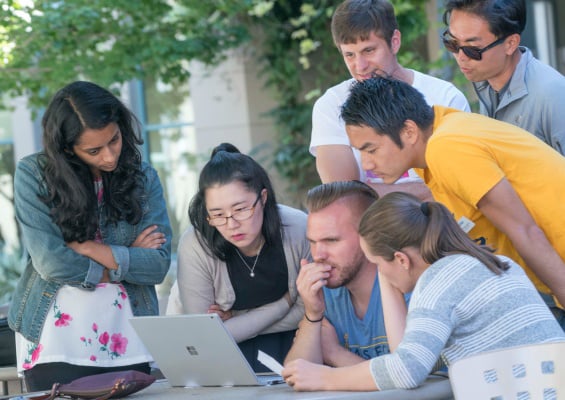“There seem to be fewer incentives for women to pursue careers in quantitative finance. Perhaps that is why women have not made very uniform advances in the industry,” Juliette Mayada Ould-Aklouche, MFE 24, observed.
The statistics bear her out: Women and men are almost equally represented in entry-level and mid-career positions in the finance sector, but men earn more and are promoted faster. As you look up the leadership ladder, women nearly disappear. Only one of the 50 largest U.S. banks is helmed by a woman and women hold less than 10% of senior positions in private equity and venture capital.
“Working in a technical role is even less obvious as a career path,” Juliette continued. Again, the numbers prove her point. Men outnumber women three to one among the ranks of financial engineers—a figure that has held steady for about a decade.
Nonetheless, Juliette is optimistic about correcting that imbalance and she is well-placed to do it. One out of three of Juliette’s classmates in the Berkeley Haas Master of Financial Engineering program is female, part of a three-year trend of steady expansion of the pipeline of highly qualified quants. And when MFEs graduate, they enter a field that has virtually no gender pay gap—a rarity in the finance industry.
Two initiatives support Juliette and her classmates. One is the Women’s Leadership Initiative, which helps women launch and advance their careers, connecting them to a strong support network of alumni and industry partners, providing professional development workshops, networking luncheons, and more. Another is the strong partnership between the program and Financial Women of San Francisco (FWSF). a group that has been “a source of insight and inspiration to professional women in the financial services profession” for 60 years.
Juliette’s first contact with FWSF happened before classes started, when she applied for one of the annual scholarships. “I did not receive a scholarship, but attending their events has been very valuable. Their social mixers are a great way to meet people and connect in a relaxed environment. You can really meet and talk with professionals almost as peers. I especially enjoyed a conference FWSF organized on ESG (environmental, social, governance) and impact investing that was held at BlackRock in San Francisco.”
A few months later, she returned to BlackRock as an intern in multi-asset portfolio management. “Unlike other MFE programs, our internships are in the winter. Being the only candidates in the marketplace is an advantage, and it probably leads to more focused attention on you during your internship. It was terrific to be at BlackRock where there are many other Berkeley Haas graduates,” she said. “The people in Career Management Services do a good job of matching us with offerings and helping us prepare our résumés and interview skills.”
Juliette, a graduate of one of France’s leading engineering schools, arrived at Berkeley Haas confident in her strong statistics and math skills and curious about finance. “I liked the dynamics of finance, how it is influenced by society and current events, and how it can influence those things in return,” she said. “And while New York is considered the hub of global finance, San Francisco is central to finance on the West Coast. I had lived in Paris and knew I wanted to study in a smaller city, where I would be less distracted by urban life and closer to nature. Berkeley and the Bay Area were perfect for that.”
Once in class, Juliette appreciated the “strong house” among Berkeley Haas faculty and other resources available to MFE students. She mentioned Professor Nancy Wallace, chief of the real estate group, who teaches Asset-Backed Securitization, and the O’Donnell Center for Behavioral Economics as two examples of “having access to real experts in a range of business and economic topics beyond financial engineering.”
In addition, Juliette continued, “I was familiar with time series models, but in our Empirical Methods in Finance class, Professor Martin Lettau showed me how to use them in a whole new way. Dmitry Livdan opened up a whole new world of options in Derivatives. ” Juliette equally appreciated classes like Equities and Dynamic Asset Management, taught by industry professionals. “Each class built on the others, so by the time you started your internship, you could put it all together.”
Juliette describes her cohort as a “medley of people. We have many nationalities and professional backgrounds, from tech to economics, from finance to machine learning. We have worked as statisticians and traders and hedge fund or asset managers. Yet, we all feel like we belong here. It is good to be in a place where your presence isn’t questioned, it is welcomed.”
Interested in having an impact through your own career? An MBA from a top business school can help you grow your network and leadership skills so you can take the next step towards a fulfilling career.









